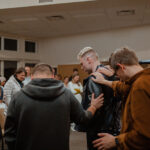
We want to communicate more to guests than “We’re glad you’re here.” We actually want to say, “We love you, as someone made in God’s image.”
By Ryan Sanders
We’re all hardwired to receive love differently.
That’s the lesson we learned in 1995 when Gary Chapman released the book that gave an “aha moment” to all of American Christendom. Seriously, if you’ve never read The 5 Love Languages, go buy a copy. It’s that important.
Chapman explained that each of us speaks a native language when it comes to giving and receiving love. My language is “Words of Affirmation.” My wife’s language is “Acts of Service.” This explains all the times when she has likely thought, He says he loves me but why won’t he show it by doing the dishes once in a while?
Chapman’s book has shown staying power beyond the realm of romantic love. Our church is using the same principles in how we welcome guests.
Our guest services ministry is designed to communicate with visitors through the love language they “speak.” After all, we want to communicate more than “We’re glad you’re here” or “We hope you come back.”
We actually want to communicate, “We love you. We love God and people made in His image. And we want to meet you with that love in the place where you are.”
So how do we say “I love you” to strangers who come to church?
Words Of Affirmation
The simplest way to communicate you care for someone is simply to tell them.
Our guest services volunteers greet people with verbal welcomes. We compliment them. We tell them we’re glad to see them. And when they fill out a welcome card, we give them a seven-day devotional journal that’s full of words meant to convey love and care.
Acts Of Service
From the moment a guest drives onto our property, they’re escorted by a parade of servants eager to help. We help them find a place to park (reserved especially for guests), we help them check in their children, we help them find a seat in the worship center.
We open doors, hold umbrellas, and walk with them to the classroom where our newcomer meeting is held.
Physical Touch
Everyone is offered a handshake coming to our worship services. Some of our ushers wear big pins that offer “Free Hugs.” And greeters at the door nearest the children’s check-in station give high-fives to the little ones.
But we have to be careful—this love language can be touchy (pardon the pun). Our male volunteers are instructed not to hug women they don’t know. And that one overzealous greeter who insisted on greeting people with a holy kiss? He’s not doing that any more (yes, that really happened).
Quality Time
Sundays are busy and most of our contact with guests happens in short snippets, so we’ve worked at building in moments of quality time where possible.
We host a newcomer class twice a month. The frequency keeps it small (six to eight people) which gives us time to get to know guests more deeply, look them in the eyes, and learn a bit of their stories.
Gifts
Finally, we offer every guest a free cup of coffee and a devotional written just for them.
I love to see people walking out of our building on Sunday, smiling and carrying that devotional, because I know they’ve just experienced love in a language their heart can understand.
Your church is probably doing some of these things well. But remember: We all have one dominant love language. What if the language you’re missing is your visitor’s native tongue? If you skip any of the languages, you may be forfeiting that guest’s return visit.
Over the past 23 years, The 5 Love Languages has strengthened thousands of marriages. It can strengthen our churches as well, if we love our guests in the right language.

RYAN SANDERS
Ryan is a writer and previously served as a pastor. He writes for the Dallas Morning News and other outlets. You can find more at theryansanders.com.












